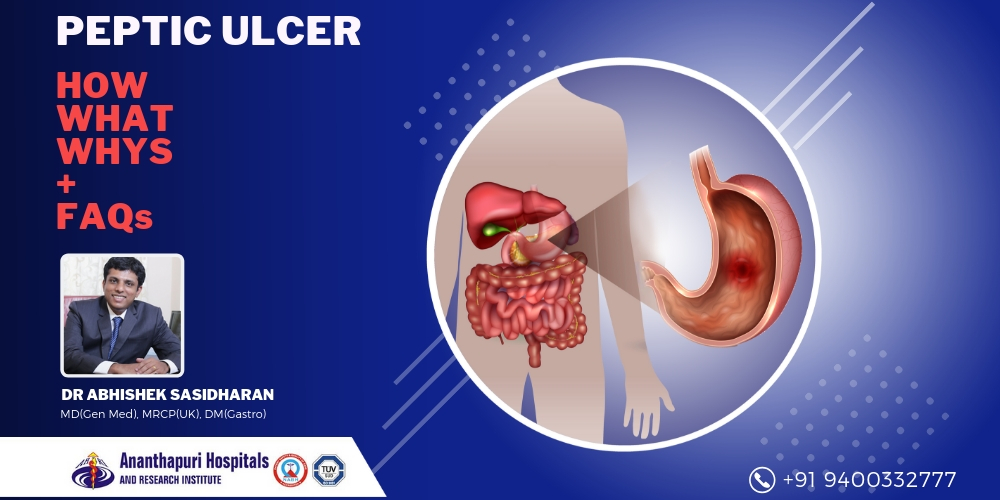- 25/March/2019

Peptic Ulcer and Its Symptoms - Ananthapuri Hospitals, Trivandrum
If you have a burning pain in your abdomen that keeps coming back, peptic ulcer is one possible reason for it! Untreated ulcers can become worse and over time it may lead to serious complications such as perforation and internal bleeding!
Don’t you think you need to be more aware of this disease?
Dr Abhishek Sasidharan MD(Gen Med), MRCP(UK), DM(Gastro) of Ananthapuri Hospitals and Research Institute, briefly explains the WHAT HOW AND WHY’S of peptic ulcer:
WHAT
A peptic ulcer is a sore that develops on the inside of the stomach lining (gastric or stomach ulcer) or on the upper part of the small intestine (duodenal ulcer).
HOW
They usually form as a result of inflammation caused by the bacteria H. pylori, or when your stomach acids erode the digestive tract’s protective layer of mucus.
WHY
A lot of factors causes breakdown of the lining. Some of them include:
- H. pylori bacteria (causes stomach infection and inflammation)
- Use of anti-inflammatory drugs
- Smoking
- Drinking excess alcohol
- Radiation therapy
- Stomach cancer
Now let’s come to some common questions that people ask about peptic ulcers!
HOW DO I KNOW IF I HAVE A PEPTIC ULCER?
These are some of the symptoms you may face if you have a peptic ulcer.
- Burning pain in the upper abdominal, extending from the navel to the chest - particularly between meals or early in the morning. This is the most common symptom.
- Black or bloody stools
- Unexplained weight loss
- Bloating
- Heartburn
- Nausea
- Vomiting
- An early feeling of fullness
HOW DO I KNOW IF I HAVE A STOMACH ULCER OR A DUODENAL ULCER?
Since the symptoms of stomach and duodenal ulcers are so similar, you cannot know for sure which type of ulcer you have. The location of the pain doesn’t always match with that of the ulcer. Your doctor may conduct several tests to make a specific diagnosis.
HOW IS A PEPTIC ULCER DIAGNOSED?
Considering the age, symptoms and risk factors of a patient, a doctor may endoscopy to diagnose peptic ulcer. Here is how it is done:
Endoscopy: A flexible fibre-optic tube is inserted down your throat to give the doctor a direct view of the inside of your digestive tract. The doctor can determine the presence and cause of bleeding and test for any bacterial infection using this procedure.
WHAT ARE THE TREATMENT OPTIONS AVAILABLE FOR PEPTIC ULCER?
Most commonly doctors use medications and alternative therapies to cure peptic ulcers. If the ulcer is caused by bacteria, the doctor may provide you with antibiotics.
With an increase in the success of acid-reducing and other pH-stabilizing drugs, there has been a decreased need to resort to surgical treatments.
However, for recurrent or severe cases such as gastrointestinal haemorrhage, perforation or gastric outlet obstruction - that do not respond to medication - surgery may be necessary.
If you experience abdominal pain or a combination of any of the symptoms mentioned above, consult a gastroenterologist immediately. To book an appointment, call us at +91 9400332777 or visit our hospital at Chacka, NH Bypass, Thiruvananthapuram.
Ananthapuri Advanced Centre for Gastrointestinal Diseases is a referral centre for patients across the globe. This centre has state of the art facilities for the early detection, diagnosis and treatment of complex gastrointestinal, liver and pancreatic diseases.
- tags
- Tumor

